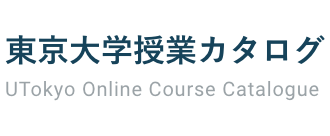過去(2019年度)の授業の情報です
学内のオンライン授業の情報漏洩防止のため,URLやアカウント、教室の記載は削除しております。
最終更新日:2024年4月1日
授業計画や教室は変更となる可能性があるため、必ずUTASで最新の情報を確認して下さい。
UTASにアクセスできない方は、担当教員または部局教務へお問い合わせ下さい。
最終更新日:2024年4月1日
授業計画や教室は変更となる可能性があるため、必ずUTASで最新の情報を確認して下さい。
UTASにアクセスできない方は、担当教員または部局教務へお問い合わせ下さい。
日本から考えるサステイナビリティ学
Sustainability Science: Japanese Perspectives
日本から考えるサステイナビリティ学
The purpose of this graduate course is to discuss Sustainability Science from Japanese perspectives showcasing various topics related to sustainability in Japan and other countries. Topics include natural disaster mitigation, aging society, biodiversity conservation, food security, pollution control, etc. Natural disasters, for example, are indispensable features to discuss human survival and sustainability, however, they are not fully elucidated in the context of Sustainability Science. Also, Japan is the first country in the 100,000 years of human history that is facing super-aging society. Japan’s experience in these fields should have great implications to disaster prone countries, rapidly aging countries and the emerging discipline of Sustainability Science.
The course will also endeavor to add new implications to relatively more established academic fields like nature conservation, food policy, and coastal engineering by elucidating Japanese cases to expand the discourses of sustainable development in general. Nature conservation, for example, is largely expanding its scope in line with the notions of biodiversity, climate change and sustainable development. To protect the biodiversity and to achieve sustainable society, conventional conservation approach is not enough, and we need to include “people” in the policy and planning of protected areas.
Understanding the diverse values towards sustainability is also a key component of this lecture course. Based on each local context, e.g. religion, culture, norms, history, geography, demography, polity, available resources and technology, possible solution and shape of governance would dramatically change. The students will be able to deepen the understanding of Sustainability Science by connecting this lecture course with the other compulsory lecture course “Proactive Environmental Studies I” which aims to teach the basics of Sustainability Science. In this course, the students will be evaluated by attendance, participation and final report.
The course will also endeavor to add new implications to relatively more established academic fields like nature conservation, food policy, and coastal engineering by elucidating Japanese cases to expand the discourses of sustainable development in general. Nature conservation, for example, is largely expanding its scope in line with the notions of biodiversity, climate change and sustainable development. To protect the biodiversity and to achieve sustainable society, conventional conservation approach is not enough, and we need to include “people” in the policy and planning of protected areas.
Understanding the diverse values towards sustainability is also a key component of this lecture course. Based on each local context, e.g. religion, culture, norms, history, geography, demography, polity, available resources and technology, possible solution and shape of governance would dramatically change. The students will be able to deepen the understanding of Sustainability Science by connecting this lecture course with the other compulsory lecture course “Proactive Environmental Studies I” which aims to teach the basics of Sustainability Science. In this course, the students will be evaluated by attendance, participation and final report.
時間割/共通科目コード
コース名
教員
学期
時限
47220-98
GFS-SS6A04L3
日本から考えるサステイナビリティ学
小貫 元治
火曜3限
講義使用言語
英語
単位
2
実務経験のある教員による授業科目
NO
他学部履修
可
開講所属
新領域創成科学研究科
授業計画
October 1
Introduction: Orientation and detailed course planning [Onuki/Tanaka]
1. Explanation of course outline
2. Self-introduction
3. Assignments for initial sessions
October 8
Topic: Population Aging as Global Sustainability Challenge
Instructor:Dr. Shogo Kudo
October 15
Topic: Rural Regeneration in Aging and Shrinking Society
Instructor:Dr. Shogo Kudo
October 23 (aware: this is Wednesday)
Topic: Time scale of sustainability -From a perspective of Japan: one of the most disaster prone countries
Instructor: Dr Motoharu Onuki
October 29
Topic: Disaster resilience: Comparison of Japanese and Dutch coastal protection
Instructor: Dr Miguel Esteban
November 5
Topic: Biodiversity Conservation in the Anthropocene: “Beyond the Boundary” model
Instructor: Dr Toshinori TANAKA
November 12
Topic: UNESCO Biosphere Reserves, Living laboratory for Sustainable Development
Instructor: Dr Toshinori TANAKA
November 19
Topic: From industrial pollution to environmental governance in Japan: Can we "teach" lessons from Japanese experience to other countries?
Instructor: Dr Motoharu Onuki
November 26
Topic: Decoupling resource/energy usage and economic growth - Japan and World
Instructor: Dr Motoharu Onuki
December 3
Topic: Understanding the inter-linkage of nature, culture, norm and law
Instructor: Dr Toshinori Tanaka
December 10
Topic: Divide and re-integration of food and agriculture -Japanese experience- 1
Instructor: Dr Hirotaka Matsuda
December 17
Topic: Divide and re-integration of food and agriculture -Japanese experience- 2
Instructor: Dr Hirotaka Matsuda
January 14
Summary discussion
授業の方法
Lectures will be provided in interactive manner.
成績評価方法
Participation (incl. class discussion) 50%
Final Report 50%
教科書
This will be provided in the introduction session on October 1.
参考書
This will be provided in the introduction session on October 1.
履修上の注意
Be sure to attend the first introduction session scheduled on October 1.





 大学院
大学院

 マイリストに追加
マイリストに追加
 マイリストから削除
マイリストから削除



